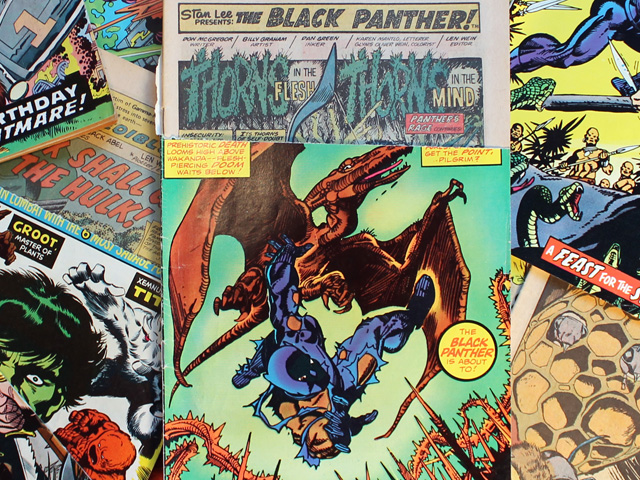
Over at Electric Literature, you can read about my childhood fascination with Marvel Comics’ Black Panther, and more specifically with his native land of Wakanda:
Black Panther is a hero in the Bruce Wayne or Tony Stark mold, a super-wealthy bachelor who uses science and athleticism to pound on bad guys. There are no secret identities — everyone knows who BP is: he’s T’Challa, the king of the African nation Wakanda, which is a mix of grass huts, deep jungle, and 1970s futurism.
The essay is a departure from my usual stuff, very loose and free floating, a sepia stream of consciousness about comics and growing up in a household where futurism was literally just laying around on tables or bolted to the roof. Whereas Panther’s color resonated with many black readers, it was the setting that captured my imagination, and still does: I nearly jumped out of my seat at the brief glimpses of Wakanda at the tail end of this year’s Captain America: Civil War.
As of this writing my essay has received 20 retweets and a dozen likes on Twitter, more than my book ever did, suggesting maybe I should write about pop culture more often. Unfortunately I’m poorly qualified for the job: I generally hate TV (some exceptions may apply), I can count the frequency I go the movies in a year on one hand, and the number of video games I’ve played to completion since 2011 tallies at exactly three. I love music but not being a musician myself I feel I lack the vocabulary to adequately speak about it. Which leaves book blogging, something I’m hoping to do more of in the new year.
Rereading my old BP comics within the full and complete context of “Panther’s Rage” has been gratifying, with Wakanda coming across as smaller than I remember (the sci-fi technology is largely confined to T’Challa’s palace) and yet bigger (more dinosaurs! snowy mountain wastelands chock full of yetis!). It’s interesting being at an age now where I can experience a phenomenon both as contemporary futurism and as retrofuturism. Something like Vernean steampunk will forever be out of reach as a potentiality and exists only for us as a quaint, even naive, vision of how things were supposed to be; but by simply living past tomorrow we can experience both the very real possibility and the hindsight of existing in what invariably turns out to be a different future.
I was recently talking to my dad about the solar panels on his house, which are solely for heating water. When I asked him whether photovoltaic panels were available in the 70s, he told me no, not commercially — the technology was in its infancy. And yet as we spoke while driving through the streets of his town, we spotted several houses with PV arrays on their roofs. Wherever you go there you are, but almost never where you thought you’d be.
I’ll be there on opening day in 2018 when the MCU Black Panther movie drops, and I’m sure I’ll have many opinions about it. Maybe I’ll even write some of them down. Meow.